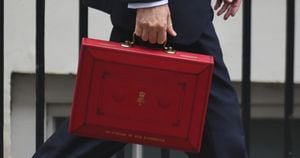Florida's upcoming election is poised to be a pivotal moment for reproductive rights, especially with voters set to decide on a significant ballot measure concerning abortion rights. This measure emerges as the state grapples with the consequences of previous legislative actions restricting access to abortion services. The conversation surrounding this issue has become more urgent following the enactment of Florida's six-week abortion ban, which has left many questioning its impact on women's health and rights.
Under the current law, which was passed earlier this year, women face increasingly stringent conditions surrounding abortion access. The law includes exceptions for certain cases, like severe fetal abnormalities, yet these are often criticized as too vague to be reliably implemented. The situation is exemplified by Thea Thompson, who found herself traveling out of state for necessary medical care after learning of serious health issues with her pregnancy. Despite the law’s stipulations, she felt the risks to her health were not adequately addressed under Florida's legal framework.
Thompson's story reflects the frustration many women experience when faced with complex legal guidelines intended to govern their medical options. She emphasized the emotional turmoil she endured after learning her unborn child would not survive, yet found herself confronting barriers imposed by the new law. These complications have not only forced Thompson out of state for care but also spurred discussions about the need for clearer guidelines and protections for women under Florida law.
The statewide reaction to the impending ballot measure reveals stark divisions. Advocates on both sides are mobilizing efforts as Election Day approaches. Proponents of the measure argue it is a necessary safeguard for reproductive rights, especially as the restrictive law continues to challenge women's health autonomy. Opponents, conversely, heighten fears about what this measure could mean for future legislative frameworks and the potential for increased access to abortion services.
Further complicate the matter is the role of federal involvement. The U.S. Department of Justice has dispatched election monitors to oversee voting across four key counties: Broward, Miami-Dade, Orange, and Osceola. This initiative aims to monitor compliance with civil rights laws but also faces pushback from state officials. Florida Secretary of State Cord Byrd has asserted the state’s legal boundaries, which restrict federal monitors from entering polling sites – creating yet another layer of tension surrounding the election.
Byrd noted the DOJ's monitors would remain outside polling locations, citing Florida's state law as the primary guideline for this limitation. His department plans to deploy its own monitors to maintain oversight and reassurance about the electoral process, illustrating the state’s insistence on jurisdiction over these processes amid rising federal scrutiny. This interplay between state and federal authorities has sparked debates about transparency and voter confidence.
The involvement of federal monitors speaks to fears of potential electoral inconsistencies as the nation grapples with broader voting rights issues. While federal observers have traditionally ensured compliance with regulations such as the Voting Rights Act, recent efforts by Florida Republican leaders aim to limit their presence at local polling sites. This trend poses questions about the accessibility and integrity of the electoral process, especially with such high-stakes issues like abortion rights on the ballot.
Voting rights groups maintain this dual-monitoring system could confuse voters, potentially discouraging civic participation. The upcoming election, particularly the ballot measure about abortion rights, presents not only make-or-break scenarios for reproductive rights but also for the overall health of democracy and voting rights within Florida.
For many voters, the choice extends beyond policy preferences and taps deeply emotional aspects of personal health, family planning, and civil rights. The outcome may well serve as a defining moment, setting the tone for future legislative battles over women’s rights and health care access.
Meanwhile, state officials continue to advocate their positions against federal mandates, arguing such federal interference may undermine voter confidence. Securing and clarifying the definitions of what composes 'acceptable exceptions' under Florida's law could be pivotal to stronger protections for women’s health and should be closely observed as citizens prepare to cast their votes.
With each passing day, as advocacy groups ramp up their campaigns and the debate intensifies, concerns remain as to whether voters will feel empowered or constrained when they finally approach their polling places. The stakes? High for both reproductive health and the cooperative spirit between state and federal governance.
Florida's 2024 election may serve as more than just another state vote; it could signal the future of reproductive rights and the health care decisions women make. Amidst this turbulent backdrop, the ability for citizens to exercise their right to vote without hindrance may very well determine the direction of policies relating to personal health, democracy, and individual liberties.



